USC SHIELD students develop missile
defense strategies to deter war
The Chinese spy balloon that floated across North America earlier this year was a stark reminder of the security threats facing the U.S. Although the balloon itself posed no danger – and was ultimately shot down after its week-long journey – the episode offered an unsettling example of foreign adversaries hovering over the homeland.
As the enormous balloon traversed the continent, national security professionals studying at USC worked to understand the policy and engineering challenges in global defense. The eight-month USC SHIELD Executive Program in Global and Space Deterrence wrapped up in April with students presenting their capstone projects, which analyzed real-world problems from missile defense command in Guam to weapons in outer space.
“The importance of missile defense has increased here dramatically over the past few years,” said Jessica Kessinger, a senior director at Raytheon Missiles and Defense who participated in the program.

The USC SHIELD program, completing its second year, is a partnership among the USC Sol Price School of Public Policy, the USC Viterbi School of Engineering and the Missile Defense Advocacy Alliance, a non-profit that seeks to generate support for continued testing and development of missile defense systems. With the goal of bridging bureaucratic gaps between policy and engineering innovations, the program brings together professionals in government, military and industry. USC SHIELD touches on a wide range of policy and engineering topics, including international diplomacy, artificial intelligence and the history of missile defense.
The diverse professional backgrounds within the cohort allows students to not only learn from professors, but from each other, too. For example, Kessinger worked with Brigadier General Jeff Smyth of the Royal Canadian Air Force for a capstone project about protecting the Arctic. They identified infrastructure obstacles in the region, and proposed solutions such as expanding airfields and using satellites to improve communications.
As a military officer, Smyth usually has only a formal relationship with people in the private sector, but chatting with industry leaders in an academic environment gave him insight into what contractors are thinking and working on. As a Canadian, Smyth also learned about the U.S. government and military, from how projects are funded to how decision makers are influenced.
“Bringing a different viewpoint of the world, different experience, different understanding of how things work, I think is valuable for my American counterparts in the course,” Smyth said. “It’s valuable for me to get a different perspective as well.”
“Some of the deepest learning is happening within the cohort,” said Candace House Teixeira, associate dean of Corporate Engagement and Programs at USC Viterbi. “The students in the program are very high level. They are experts, teaching each other and leading conversations in each session.”
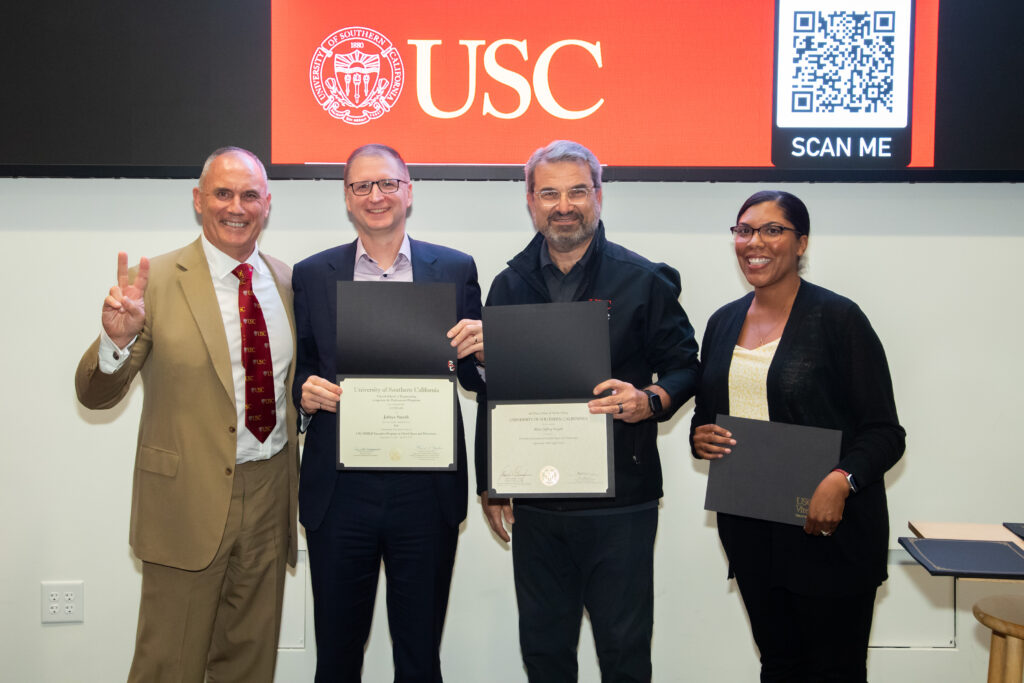
Capstone projects provided some sobering assessments of the capabilities – and limitations – of U.S. missile defense. For example, one group detailed how competing countries like Russia and China made their weapons difficult to detect with radar systems.
The students – Lieutenant Colonel Autumn Lopez of the National Guard Bureau, Major Jese Snyder of the United States Northern Command, and Rob Wittenauer of the Nuclear Command, Control and Communications (NC3) Enterprise Center – explored how airships known as “dirigibles” could extend missile detection ranges by elevating radars thousands of feet above ground. They cited the Chinese spy balloon in arguing for the need to regulate this “near space” area.
“Our program is about deterrence. We are about making sure that war never happens – that’s our main aim,” explained Frank Zerunyan, director of Executive Education at the USC Price School’s Bedrosian Center on Governance. “To do that, you have to know the reality. You have to know what’s real and what’s false hope.”
The capstone projects are meant to be shared with students’ supervisors, so they can be useful to military commands tackling those very problems, Zerunyan added.
“This second year has been phenomenal. We’ve been able to take the program to new heights where we’re delivering six capstones that are relevant in today’s fight for deterrence, all the way from space into the Pacific into our homeland,” said Riki Ellison, founder and CEO of the MDAA. “We’re producing something that’s very special.”
To see more photos from USC SHIELD’s capstone presentations, click here.
A Marriage of Engineering and Public Policy: USC’s Global Space and Deterrence Program Returns
Marc Ballon | September 23, 2022

THE USC SHIELD EXECUTIVE PROGRAM IN GLOBAL SPACE AND DETERRENCE KICKED OFF AT USC ON SEPTEMBER 15, 2022 WITH ITS SECOND CLASS OF HIGH-LEVEL MILITARY, GOVERNMENT AND INDUSTRY SECURITY EXPERTS. (PHOTO/TOM QUEALLY)
To Kenneth Michel, the military threats to the security of the world’s democracies have only intensified in the past five to 10 years, especially from ever-improving ballistic and other missiles.
That’s why Michel, an operations officer who works in the strategy and policy directorate for the U.S. Indo-Pacific Command in Honolulu, recently flew from Hawaii to Southern California to participate in the opening session of the USC SHIELD Executive Program in Global Space and Deterrence.
From Sept. 15 to Sept. 17, Michel and more than 20 other high-level military, government and industry security experts met at USC for the kickoff of USC SHIELD. The eight-month program aims at teaching U.S. and other leaders to understand how to tackle growing issues of national security while bridging bureaucratic gaps between policy and new engineering innovations.
Michel said he looked forward to collaborating and making connections with other leaders in security issues and learning from them.
“As someone who works in the policy shop, I think it’s important to gain [new] perspectives on missile defense,” Michel said. “It’s great that [USC SHIELD] brings a lot of people together – not just military, but people from academia, government personnel and other areas to discuss the missile defense problem, which is especially pertinent in today’s age given the potential areas of conflict.”
Drew Hirsekorn, a Morristown, New Jersey-based Lockheed Martin technician director, agreed. “Collaborating with and getting perspectives from people from different organizations, who are experts in other areas, would be very beneficial for me to get different ideas and tools,” said Hirsekorn, who delivers ballistic missile defense capability to naval platforms.
Over the next several months, 23 participants from the U.S. and Canada will attend hybrid classes given by professors from the USC Viterbi School of Engineering and the USC Sol Price School of Public Policy, in partnership with the Missile Defense Advocacy Alliance (MDAA). They will explore topics ranging from organizational behavior to how to avoid common errors in engineering assessment, from the essentials of inventive thinking to a case study of the first intercept of a long-range ballistic missile in 1961.
Two three-day sessions will be held in person at USC and one will take place in Washington D.C. Additionally, site visits are planned for Vandenberg Space Force Base and the Space Systems Command at Los Angeles Space Force Base.
As part of USC SHIELD, participants must write and present a group capstone project. Upon completion of the program, students will receive a USC continuing education certificate.
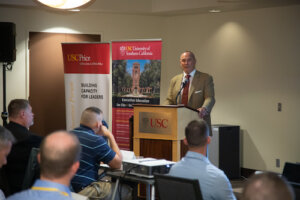
RIKI ELLISON, A 1983 USC DORNSIFE GRADUATE; FOUNDER AND CHAIR OF THE MISSILE DEFENSE ADVOCACY ALLIANCE (MDAA); AND A THREE-TIME SUPER BOWL CHAMPION WITH THE SAN FRANCISCO 49ERS IN 1985, 1989 AND 1990, PLAYED AN INTEGRAL ROLE IN THE CREATION OF USC SHIELD (PHOTO/TOM QUEALLY)
“We want to create the leading academic community in critical thinking of a new deterrent in space that’s required today,” said Riki Ellison, a 1983 USC Dornsife graduate; founder and chair of MDAA; and a three-time Super Bowl champion with the San Francisco 49ers in 1985, 1989 and 1990. “We are striving for educational and academic excellence in an area that nobody else is focused on.”
Members of this year’s class hail from the U.S. Space Force, U.S. Space Systems Command, Army, Navy, Marines, Air Force, National Guard, INDOPACOM, NORTHCOM, SPACECOM, STRATCOM, Canada, the Missile Defense Agency and industry.
Frank Zerunyan, professor of the practice of governance at the Price School, said the creation of USC SHIELD reflects the university’s longstanding support of the Armed Forces.
“Our relationship with the United States Military is more than a century old,” said Zerunyan, who also serves as director and university liaison for USC ROTC and Nautical Science Programs. “We develop the leaders of tomorrow in our elite ROTC Programs and, in this program, interact with today’s leaders to enhance missile defense and deterrence policy and innovation.”
Neil Siegel, USC Viterbi’s IBM Professor of Engineering Management, will teach five of USC SHIELD’s 15 lectures this year, including risk management and problem-solving. Siegel, a member of the National Academy of Engineering who came to USC after a long career a vice-president at Northrop Grumman, said adult learning is one way that the university can contribute to society.
“This kind of outreach to industry and the government is part of the university’s mission,” Siegel said. “USC has had an adult education component for at least 50 years.”
Launched in 2021, USC SHIELD will be even stronger this year, said Candace House Teixeira, associate dean of corporate engagement and programs. She said feedback from the inaugural class has led to the addition of classes on big data and digital technologies, among other subjects.
“We’ve taken feedback from our impressive first cohort and fine-tuned the program with the leadership of our faculty members and partners at MDAA,” she said. “It’s now a more mature program that continues to develop leaders in global space and deterrence. I’m excited for this year’s cohort and for the future.”
USC Executive Global Space and Defense Program Concludes Inaugural Year
Leaders from military, government and private industry complete unique USC certificate program

A CAPSTONE PRESENTATION FOR THE EXECUTIVE GLOBAL SPACE AND DEFENSE PROGRAM (CREDIT: HANNAH BENET)
For George Christoph, a lieutenant colonel in the U.S. Air Force stationed in Panama City, Florida, USC’s Executive Global Space and Defense Program couldn’t have been offered at a more relevant time.
According to Christoph, it’s one thing to ponder theoretical threats, but “it’s another thing to see it in action with Russia acting out what they said they were going to do. I hope this makes everyone realize this threat [missile defense] is real, and it can happen.”
On April 30, 29 high ranking officials from the military, government and innovation communities completed the first USC Executive Program in Global Space and Defense. The eight-month course began last September aiming to build leaders who understand how to tackle growing issues of national security while bridging bureaucratic gaps between policy and new innovations.
Indeed, the program’s capstone events, April 28-30, coincided with Russia’s recent missile attack on Kiev, underscoring the global stakes for missile defense.
The first cohort was made up of professionals holding various positions in the Department of Defense, U.S. Army, U.S. Space Force, U.S. Air Force, U.S. Navy, The National Guard, The Boeing Company, Lockheed Martin and Raytheon Technologies.
Upon completion of the course, Christoph says he plans to brief top ranking military officials on the valuable lessons he learned from the USC executive education program.
The course, taught by faculty in the USC Viterbi School of Engineering and USC Sol Price School of Public Policy, in partnership with the Missile Defense Advocacy Alliance (MDAA), teaches students how to make informed, strategic choices when it comes to public policy and engineering.
“You can have the best engineering solution in the world, but it doesn’t matter if the policies in place don’t allow you to utilize that solution,” said Riki Ellison (USC Dornsife ’83), the founder and chairman of MDAA. “We wanted to create a culture of excellence where we can teach future leaders how to collaborate, exchange ideas and create key relationships.”

EXECUTIVE GLOBAL SPACE AND DEFENSE PROGRAM (CREDIT: HANNAH BENET)
Participants joined the program from across the country looking to learn how to better defend against international threats to the U.S. homeland and outer space.
To better understand how to address real-world defense challenges, students heard from guest speakers that included senior defense officials, military leaders and experts in defense policy and operations.
Military experts say incorporating professionals with a variety of security and defense backgrounds helps to build collaboration and ultimately strengthens military defense.
“After this course, one of the military professionals may personally and professionally know a senior person from Boeing so they can actually pick up the phone and say, look at what’s going on here internationally, do you have this on the shelf or what can we do to help enable and speed this process,” said Rear Admiral Victorino G. Mercado (ret.), MDAA’s academic innovation liaison to the project and former assistant secretary of defense for strategy, plans and capabilities at the U.S. Department of Defense.
Students completed the course with capstone projects designed to analyze the toughest engineering and policy problems while producing tangible solutions.
The group capstone project topics ranged from missile defense challenges, to how to respond to an attack on U.S. satellites and how to defend Guam.
Delivered as a hybrid class, students attended interactive lectures online via DEN@Viterbi and on-campus.
As countries continue developing next level hypersonic missiles that travel out of the atmosphere and into space, and North Korea tests intercontinental ballistic missiles, the U.S. Space Force has become a key component in the conversation of national and global security.
It’s a topic that also took center stage in the course that provided students with visits to Vandenberg Space Force Base and The Los Angeles Space Force Base.
“Understanding what’s new in academia and how we can apply that to what we do in space was extremely valuable and exactly what I was hoping to get from this experience,” said Colonel Heather Anderson with the U.S. Space Force. “It gives me a different strategic picture.”
Participants receive USC continuing education certificates and Continuing Education Units once they’ve successfully completed the course. Planning for the next Executive Program in Global Space and Defense has begun, with an anticipated launch of fall 2022.
Candace House Teixeira, Associate Dean for the USC Viterbi School of Engineering shares “ It is unique for an executive education program to bridge diverse academic areas, such as engineering and policy, with the real-time needs of the U.S. Military and industry partners. We look forward to years of continued program development in this area. This is just the beginning!”
“As a university, we are immersed in the future of the globe and that’s exactly what we are doing through this program by bringing an interdisciplinary approach to missile defense,” said Frank Zerunyan, USC Price director of executive education.

The Los Angeles Times recently published an opinion shaming local jurisdictions and SCAG. Sadly, the Times continues to push an ideologically motivated false narrative about local land use.
For local governments and their representatives to protect and defend their communities against an unconstitutional power grab is not shameful but a badge of honor.
We are elected to defend our communities from being decimated with excessive strains on our environment, water supply, energy, roads, broadband, and public infrastructures. We are the ones responsible for the health and safety of our residents. We have the daunting task of evacuating our residents in the case of a disaster. Irresponsible one-size- fits-all land-use planning at the state level without regard to our local infrastructure challenges is, in fact, shameful and dangerous. Helping developers skirt our local land-use laws is disgraceful.
Perhaps we at the local level are the only true environmentalists. Our infrastructures cannot support uncontrolled building. Pouring concrete all over California, cutting trees, violating open spaces will not solve the affordability crisis.
There is a reason why laws like Senate Bill 9 and Senate Bill 10 pay no attention to CEQA or any other local law to protect our residents’ environment, health, and safety. There is a reason why more than 70% of Californians oppose SB 9 and SB 10, according to a survey by David Binder Research.
In the last five years alone, based on construction industry data from building permits, SCAG estimates that 274,925 new units were built in the SCAG region from 2016 to 2021. Additionally, Census 2020 and newly available HCD data indicate that smaller units such as ADUs, garage conversions, etc., may not be fully captured in this figure, so regional production is likely 15-20% higher. The Times and their ideological allies will be better off reporting the facts rather than pushing false narratives about local jurisdictions blocking housing supplies.
The Times and their political allies will be better suited to come up with collaborative solutions to find financially and regionally viable funding structures for the private sector to build affordable housing. We at California Contract Cities Association are precisely supporting and sponsoring such a bill based on success stories like the Irvine Land Trust.
Frank V. Zerunyan is mayor of the city of Rolling Hills Estates.
USC Price and USC Viterbi Schools launch new executive education certificate in global space and defense
The USC Sol Price School of Public Policy and the USC Viterbi School of Engineering, in partnership with the Missile Defense Advocacy Alliance (MDAA), announced the creation of the Executive Program in Global Space and Defense. The official signing of the partnership occurred on June 15, 2021 at Ralph and Goldy Lewis Hall on USC’s University Park Campus.
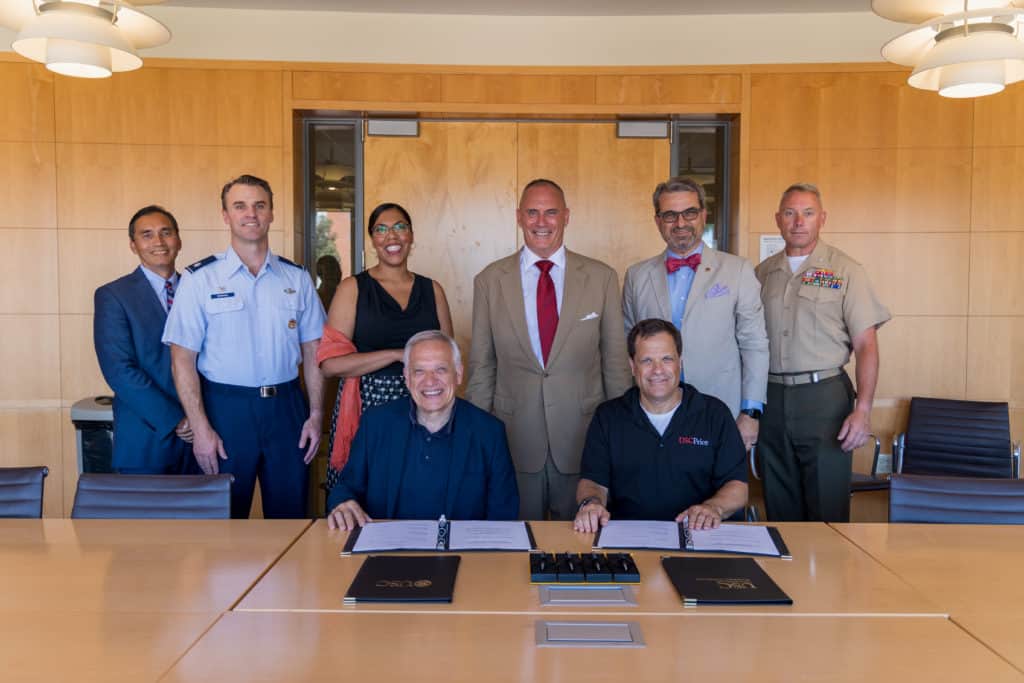
The executive education program sets out to educate aspiring senior leaders from the military, government and innovation communities about the intersection of public policy and engineering, which are too often separate within the complex and growing field of defense security.
Alumni Riki Ellison (USC Dornsife ’83), the founder and chairman of MDAA, brought the idea to USC in early 2021. It wasn’t long before Yannis Yortsos, dean of the USC Viterbi School, connected with Candace House Teixeira, USC Viterbi’s associate dean of corporate engagement and programs. They began working with Dana Goldman, interim USC Price dean, as well as Frank Zerunyan, USC Price professor of the practice of governance and director of executive education programs.
“Usually we engineer, innovate, create technology, and then public policy gets involved,” said Teixeira, who will be co-creating the certificate’s curriculum and faculty appointments with Zerunyan. “But we could be having this collaboration earlier. In fact, I often hear this from our students in government and the military. This new program will give us the opportunity to get students and experts together in a single room from the very beginning and explore the bigger picture.”
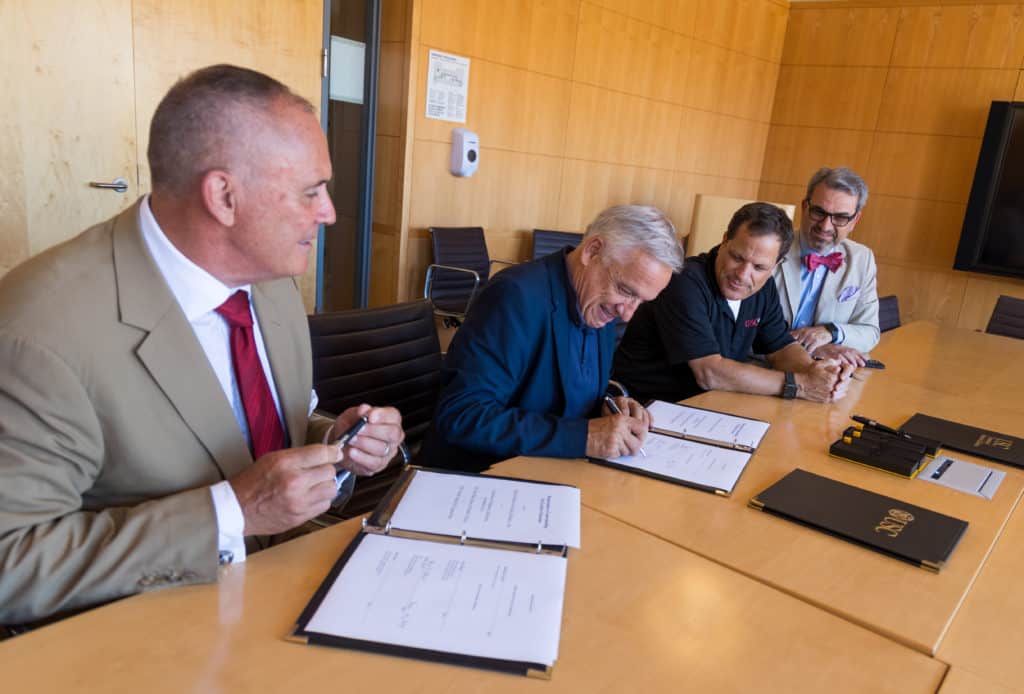
While the Executive Program in Global Space and Defense will prepare participants to tackle the challenging security issues of today, it has deep roots in Los Angeles’ history.
“Right after World War II, the defense industry surged in our backyard,” said Zerunyan, who also serves as the director of USC’s ROTC program. “If not for this industry and the jobs it provided, the economic development of Los Angeles County would have been very different.”
“Viterbi and Price solidified their presence in the early 1900s,” Zerunyan added. “As the decades continued, our complementary expertise and academic exploration added to Los Angeles’ community building in the 1950s and beyond, especially as local industries expanded. Hosting this new certificate program at the University of Southern California reaffirms the intersection of defense technology, community and governance at our county’s core and reflects our central mission: the development of human beings and society as a whole.”
Starting in September 2021, enrollees from across the country will participate in the seven month course that features expert USC Price and USC Viterbi faculty with guest speakers from current and former senior defense officials, military leaders and experts in defense policy, strategy, operations and innovation.
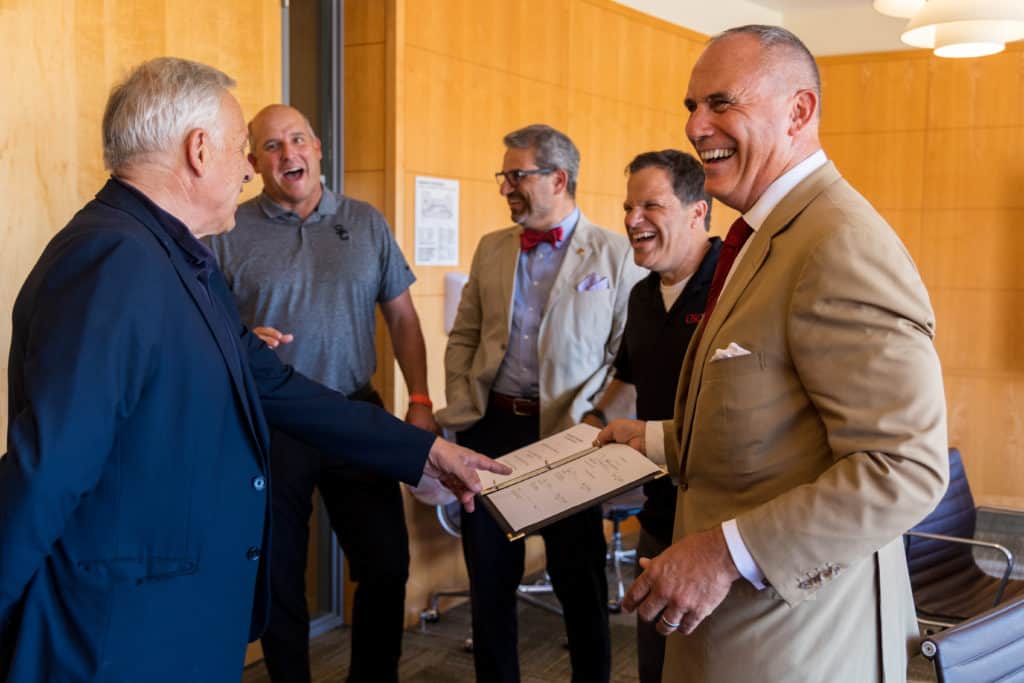
Ellison, who is also a former USC championship scholar-athlete, shared his excitement about the partnership, saying, “I knew I wanted to attend USC when I was 12 years old. Since then, I’ve realized that dream and am on to the next. I studied policy myself, and I know the frequent struggle of putting new engineering tools into the field. That’s where the certificate comes in, and the education it brings along with it. We’re going to empower the best of the best to be the best across relevant fields to create a powerful intersection of top engineering studies alongside the policy they’ll need to enable real action in making our world safer.”
The hybrid online/in-person structure will include at least two residency sessions on USC’s campus to expand invaluable networking opportunities for professional development. At the course’s culmination, participants will produce a capstone that tackles real-world defense challenges.
“There’s nothing more complex than the challenges of missile defense and the policy issues at home and worldwide,” said Rear Admiral Victorino G. Mercado (ret.), MDAA’s academic innovation liaison to the project and former assistant secretary of defense for strategy, plans and capabilities at the U.S. Department of Defense. “Future senior leaders will need to know how to make very informed, strategic choices when billions of dollars are at stake, and those decisions will be highly consequential to the defense of our nation. It’s great to see USC and MDAA get together on this topic. The time for this certificate is now.”
Don’t want federal agents in your city or town? Then protect federal property
August 5, 2020 8.29am EDT
By, Frank V. Zerunyan
I recently visited Portland, Oregon, and saw the destruction around the federal courthouse there – walls defaced with graffiti, fences vandalized, and the remains of garbage fires that had been set.
The vast majority of anti-racism protests over the past two months in the city have reportedly been peaceful, and the damage was due to a small minority of rioters who fought police and federal agents around the building.
President Donald Trump sent in federal agents, claiming Portland was no longer able to maintain order and adequately protect federal property.
The agents’ uninvited presence, and how they purportedly treated protesters, escalated the conflict. The city’s mayor and Oregon’s governor repeatedly asked the agents to leave; the state attorney general sued to restrict the operations of federal agents. The federal presence, they said, violated the 10th Amendment, which guarantees a state’s sovereign right to police its citizens. A federal judge in Portland rejected the state’s arguments for lack of standing.
As a three-term mayor and city council member, as well as a legal scholar, I know that what’s called “home rule,” or local control, is the most sacred refrain in the vocabulary of every mayor and council member I know.
At the same time, the scene I witnessed at the federal courthouse in Portland is disturbing. As political interests on both sides fuel the fire of the violence, the American people are left wondering if federal agents will appear in their cities next.
State sovereignty, freedom, independence
The Founders feared an authoritarian central government. They worked to create a functional republic strong enough to enforce national interests but limited enough to assure individual self-determination where citizens lived and worked.
While the concept of the municipality, and therefore home rule or local control, is not described in the United States Constitution, the 10th Amendment guarantees such local authority to the people through the states.
The concept of decentralized governance predates the 10th Amendment. Article II of the 1777 Articles of Confederation, the predecessor to the Constitution, grants each state “sovereignty, freedom and independence.” The 10th Amendment is the natural progression of Article II.
The constitution of each state is where “local control” is spelled out in detail, including police powers to help govern public health, safety and welfare. Since 1824, the U.S. Supreme Court has affirmed the right of states to exercise these police powers, including, in the current context, quarantine laws and health laws of every description.
Over the years, more conservative Supreme Court justices have specifically invoked the principle of reserving police powers to states. Justice William Rehnquist, in striking down a federal law which prohibited bringing a gun into a school zone, said that law threatened to convert federal authority into a “general police power of the sort retained by the states.”
Local governments must plan without delay for post-pandemic fiscal realities
May 11, 2020
By David S. Kupetz, J.D. and Frank V. Zerunyan, J.D.
The COVID-19 pandemic continues to devastate the national and global economies. The economic impact from the pandemic will disrupt California’s fiscal condition and harm local government revenues this year and, potentially, for years into the future. In a letter addressed to the California Legislature, the State’s Director of Finance predicts a recession and “significant negative effects on state revenues.”
Most municipalities predominantly depend on sales tax, property tax, transient occupancy tax, documentary transfer tax, gas tax, parking user’s tax as well as licenses, permits, and fees. Politico, in a recent article, estimates the loss from these sources due to the pandemic to be about $7 billion in revenue shortfalls for California local governments over the next two fiscal years, assuming the “stay at home orders” are lifted by June 1. The article warns that this estimate can grow exponentially should the “stay at home orders” last through the summer and beyond.
The market is another critical indicator of vulnerabilities for state and local governments. Any new economic downturn may particularly exacerbate the vulnerability of California’s already challenged pension system. California’s Legislative Analyst’s Office (LAO) estimates the State’s unfunded pension liabilities to be a total of 93.1 billion ($59.7 billion at CalPERS and $33.4 billion at CalSTRS). Adding retiree health unfunded liabilities to this figure increases the total to nearly $200 billion. These are significant unfunded liabilities, which continue to grow due to changing market assumptions. Even before COVID-19, these organizations decreased their rate of return by .5%. If markets further constrict, local government budgets will have to fill the gap.
There were already many local governmental entities facing significant financial challenges pre-pandemic. As identified by the California State Auditor and spotlighted on the Auditor’s website, some of these pre-existing problems plaguing various municipalities include insufficient liquidity, excessive debt burdens, inadequate reserves, declining revenues, and unsustainable employee retirement and health care obligations. These problems existed during a sustained period of economic expansion. With the onset of a recession, without proactive action, many local public entities will be hammered by reduced revenue collections coupled with escalating pension and healthcare expenses.
Coronavirus: Telemedicine is great when you want to stay distant from your doctor, but older laws are standing in the way
April 2, 2020
By, Frank V. Zerunyan
As of April 1, there are more than 179,000 confirmed cases of COVID-19 in the U.S. Nowhere has been hit harder than New York City where there are more than 76,000 confirmed cases and 1,550 people have died. As many had feared, the city failed to “flatten the curve” and medical need has exceeded what the health system can provide.
In an effort to free up critical beds and resources, all elective surgeries have been canceled. Health officials are even urging people symptomatic for COVID-19 but less vulnerable – those who are generally healthy and under 60 years of age – to stay home and away from emergency rooms for fear of infecting others or taking up much-needed beds.
With access to in-person care extremely limited – and potentially dangerous – many hospitals have started treating and meeting patients through phone calls and over the internet.
A perfect answer to pandemic problems
I am a former member of the Medical Board of California and have been working with telemedicine regulation since 2006 when California Gov. Arnold Schwarzenegger appointed me to the board. After years of steady but frustratingly slow growth in telehealth across the U.S., it is exciting to see telehealth finally being utilized as an important tool to deliver care.
Climate Change Begins at the Local Level
March 3, 2020
By, Mark Bodziak

You’ve heard the phrase: “Think globally, act locally.” The USC Sol Price School’s Executive Education (EXED) Forum for Local Leaders– Opens in new window believes you must act on climate change at the local level to help the planet as a whole.
Participants at USC’s Sustainability Summit held recently in Palm Springs — including local government officials, industry experts and USC faculty researchers focused on urban planning, economics and the environment — share this belief. Sponsoring organizations included Southern California Edison and the Metropolitan Water District.
“The most impactful climate action is at the local level,” said Frank Zerunyan, director of Executive Education at USC. “We bring our academic research to the practice. We teach what we study to promote sustainability. Our goal is to reach as many cities as possible.”
Are Hong Kong’s Protests an Internal Chinese Affair?
August 26, 2019
By, Frank V. Zerunyan

The people of Hong Kong are exercising a right Americans have known for 243 years. The right to petition the government for a redress of grievances without fear of reprisals is the right of every American. Americans see these rights as part of the natural or human rights granted to them, not by their government but by their “creator.”
“Life, Liberty and the pursuit of Happiness” is a well-known phrase in the United States Declaration of Independence. The Founding Fathers believed that natural rights are inherent in all people as inalienable rights, which cannot be surrendered to any government under any circumstances.
Today, most western democracies adhere to the principles of life, liberty, and the pursuit of happiness. Indeed, Hong Kong enjoyed these rights as a British Colony for the better part of 150 years.
Hong Kong still governs under its judicial system, with semi-sovereign borders and rights such as freedom of speech and assembly. The city still enjoys freedoms not seen in mainland China, but these freedoms are on the decline. While China may have exercised restraint during the protests for a possible compromise, clashes and threats by the Chinese government are frightening.
Hong Kong: Internal Chinese Matter?
The Chinese state media outlet Global Times reported on August 12 that Chinese troops were moving to the border city of Shenzhen in an apparent show of force to quell any protest. President Donald J. Trump tweeted that U.S. intelligence confirmed that Beijing is advancing troops toward Hong Kong.
Second annual City Managers’ Summit focuses on employee satisfaction, climate change, leadership

“I see city managers as kind of unsung heroes,” USC Price Dean Jack H. Knott said in his welcoming remarks. “I don’t feel you get the recognition and respect that you deserve for the fantastic job you do managing complex organizations.”
Professor Frank Zerunyan, director of executive education for the Price School’s USC Bedrosian Center on Governance, organized the event, held Nov. 15 at the USC Radisson Hotel to help practitioners more effectively implement policy. Zerunyan is a past president of the CCCA.
“I see city managers as kind of unsung heroes,” USC Price Dean Jack H. Knott said in his welcoming remarks. “I don’t feel you get the recognition and respect that you deserve for the fantastic job you do managing complex organizations.”
Professors William Resh and Frank Zerunyan survey Long Beach city employees

In August, the City Council for the City of Long Beach voted to request the City Manager to encourage all city employees to participate in the USC Price School of Public Policy’s State of the Service public employee survey.
USC Price Associate Professor William Resh and Professor Frank Zerunyan are in the final months of collecting data for their two-year comparative study intended to provide local cities with data as to the needs of their employee workforce, with a specific focus on citizen engagement practices within the municipalities.
Zerunyan offers Armenian public officials lessons on governance, collaboration, leadership
USC Price School of Public Policy Professor Frank Zerunyan returned to Armenia this summer for a fifth year of executive education efforts training public servants and military leaders in public administration and management.
The centerpiece of Zerunyan’s trip was an intensive four-day training course on governance, ethics, collaboration, leadership and strategic planning that he taught at American University of Armenia. While in previous years attendance was dominated by representatives of the defense ministry, this session included a greater variety of public administrators than ever before, featuring officials from the ministries of economics, justice, transportation, energy, finance, defense and sports and entertainment.
First annual City Managers’ Summit aims to help practitioners more effectively implement policy

More photos available on Flickr
The USC Price School of Public Policy partnered with the California Contract Cities Association (CCCA) and the Municipal Management Association of Southern California on Nov. 16 to host the first annual City Managers’ Summit, which addressed a range of topics from innovative performance evaluation approaches to community policing.
The impetus for the event originated when Mark Alexander, a Price MPA alumnus who serves as city manager for La Canada Flintridge and chairs the city manager’s committee for the CCCA, went to Professor Frank Zerunyan with a request. As director of executive education for the USC Bedrosian Center on Governance, Zerunyan has helped about 300 city mayors and council members advance in their careers as public servants over the past five years. Alexander wanted to focus Zerunyan’s expertise on the people who run the day-to-day operations of a city.
Price School, Zerunyan endeavor to establish PhD policy, management program in Armenia

The USC Price School of Public Policy is pursuing a plan to establish a special doctoral program in public policy and management in Armenia, designed to build the academic infrastructure to address the significant public management needs of this growing country and region.
While Armenia has a growing need for trained public policy and management professionals, it currently does not have a Ph.D. program at any of its universities that can provide training to meet this particular need. The USC Price Armenian Scholars program would begin with awarding one student from Armenia a full scholarship to enroll in the Ph.D. in Public Policy and Management program at the Price School in 2019. Scholarship recipients must make a commitment to return to Armenia to teach, research and train.
From tragedy, a dedication to education and service
By Leslie Ridgeway
Frank Zerunyan remembers the stories his grandmother told about the Euphrates River running red-brown with blood and the bodies floating in it, about the relentless violence and killings, and being prodded to the Deir ez-Zor desert in Syria by military police who offered little or no food or water. She lost the use of one eye during the death march, but among all those terrible memories, the cause eluded her.
“Years later I asked some doctor friends what could have happened, and they said it was the stress that shut one eye off,” said Zerunyan, Professor of the Practice of Governance and Director of Executive Education at the USC Sol Price School of Public Policy. “She saw people being raped, soldiers taking their swords and stabbing pregnant women. It was scary to hear these stories.”
Gazing into his grandmother’s one good eye while she spoke left a lasting impression, he said.
“You look in that one eye, and you could feel and sense the pain,” he said. “I am eternally grateful that I could spend the time with my grandmother and learn about my heritage. I can’t bring back my ancestors – but every effort that I make is to prevent another (genocide) from occurring.”
During April, declared Armenian History Month in Los Angeles County by the L.A. Board of Supervisors, many like Zerunyan are remembering the past and taking steps to shape a brighter future for Armenia and the rest of the world. For him, the way forward leads with education and public service, evidenced by his law degree from Western State University, his three terms as mayor of the City of Rolling Hills Estates, and his academic career at USC Price.
His family tree includes a great-grandfather and great-uncle, both of whom were killed in the actions recognized today by 29 countries as the Armenian Genocide, and both of whom dedicated their lives to education and public service.
“My great-grandfather was a member of the school board and my great-uncle was a professor at the American university in the Ottoman Empire,” said Zerunyan from his office at the Price School. “Both were slaughtered in the early stages of the genocide because they were part of the intelligentsia and in public service. The only thing I could hope for is that I could do (education and public service) somewhere else.”
USC professor spotlights the significance of Latinos to California’s future
Public officials from the League of California Cities Latino Caucus take part in an executive education forum
October 11, 2016

By, Matthew Kredell
The USC Price School of Public Policy has taken a leading role in training local decision-makers and its partnership with the Latino Caucus demonstrates the inroads it has made.
That’s a thought from USC Price Professor Raphael Bostic.
USC Price hosted more than 20 public officials from the League of California Cities Latino Caucus, who took part in the Bedrosian Center on Governance’s Local Leaders Executive Education Forum on Sept. 22 and 23.
The participants, many of whom are mayors or council members of cities across California, heard presentations from USC Price faculty on leadership, public ethics and housing policy, among other topics.
Professor Frank Zerunyan, director of executive education at the Bedrosian Center, led the program, which was the product of an agreement that USC Price and the Bedrosian Center signed with the Latino Caucus in 2014 to provide training aimed at enhancing the leadership capacity of public officials statewide.
USC professor sparks dialogue on collaborative governance
September 22, 2015
By, Cristy Lytal
SC Price School of Public Policy Professor Frank Zerunyan recently served as the first international expert on local governance models brought in to consult with public officials and community leaders from the Bao’an District in the city of Shenzhen, China.

Zerunyan, a former two-term mayor and current councilman of the city of Rolling Hills Estates, received the invitation from Haobo Yang, vice chair of the Bao’an District Committee, who previously studied with Zerunyan in an executive education course at USC Price.
“The Bao’an District Social Work Committee, as well as scholars from Tianjin and Tsinghua universities, are studying community governance and innovations on collaboration and engagement of Bao’an communities,” said Zerunyan, who is the director of executive education at the Bedrosian Center on Governance and the Public Enterprise. He also lectures at the United Nations headquarters in New York and at UN Forums around the world as an appointee to a UN experts committee on capacity building in public administration.
The needs of a booming population
With a population of more than 5 million people, the Bao’an District is the largest administrative district of Shenzhen City, a boom town that has grown from a village of 30,000 to a metropolis of 10.6 million in about 30 years.
“It’s only a district of the entire city, and it’s bigger than the city of LA,” Zerunyan said. “It’s colossal.”
Bedrosian Center seeks to improve Armenian public administration
Frank Zerunyan heads effort to broaden understanding of key issues among leaders in the public sector
July 3, 2015

The USC Bedrosian Center on Governance and the Public Enterprise has formed a relationship with Armenian educators and leaders seeking an understanding of democratic and decentralized governance in the post-Soviet era of their young republic.
The effort is spearheaded by Frank Zerunyan, a professor of the practice of governance at the USC Price School of Public Policy and director of the Executive Education Forum for Policy at the Bedrosian Center, which offers specialized non-degree certificate programs designed to broaden public-sector leaders’ understanding of substantive policy issues.
Zerunyan has adapted the program’s curricula into a series of workshops and lectures for current and future Armenian leaders seeking to lead the young democracy forward and away from its history of centralized Soviet government influence.
From South Africa to Armenia, Frank Zerunyan helps to shape public leadership
USC Price professor circles the globe, sharing his expertise on effective governance
June 29, 2016
By, Matthew Kredell

USC Price School of Public Policy Professor Frank Zerunyan furthered his efforts to impart lessons in effective governance and public-sector leadership across the globe with recent speaking engagements and workshops in the nations of South Africa, Armenia and Georgia.
Local lessons, global impact
In May, Zerunyan, director of executive education at the USC Bedrosian Center on Governance, was in South Africa to serve as the keynote speaker at the city of Tshwane’s inaugural conference on “Leadership in Local Government.”
His speech focused on collaboration from the public, private and nonprofit sectors to produce good governance, and how leadership connects all thematic subject matters that fall under implementation and sustainability in local government. Many of the insights came from his new co-authored book Newgotiation for Public Leaders: The Art of Negotiating for a Better Outcome.




